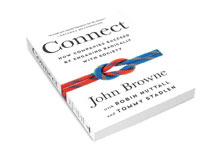The life of a strategy consultant is notoriously hectic.
Long working hours and busy travel schedules leave little time for R&R, so non-essential reading usually falls to the bottom of the ‘to-do’ list (trust consultants to ensure even leisure activities are meticulously planned and designated!)
As such, it makes sense to choose books which are entertaining, engaging, but also informative. And it just so happens that there is a world of literature which ticks all of these boxes, combining fascinating psychological theories, case studies of business prowess, and concrete suggestions for self-improvement. Maximising productivity by learning and enjoying at the same time – what could make a consultant happier!
In a world of fluffy entertainment, it can be hard to find media with substance. I’m one of the worst culprits (24 episodes of My Kitchen Rules in 8 days), but, just like my dedication to eating a healthy diet, I recently made a decision to be more conscious of the media I consume. And so, in true consultant fashion I’ve made a new goal: a book a week for the remainder of 2017. And not the newest Jack Reacher thriller or Jodi Picoult – I’m only counting the meaty stuff.
So, without further ado, here’s my top five picks that will keep your brain entertained in the taxi traffic jam, crowded commuter train or lengthy long-haul flight – wherever the next consulting project takes you!
1. Thinking, Fast and Slow, Daniel Kahneman
Shooting to international notoriety with his receipt of the Nobel Prize in economics in 2002 for his work regarding ‘prospect theory’, psychologist Daniel Kahneman is perhaps one of the best known and most widely respected scholars in his field. The Fast and Slow of the title refers to the dual ‘systems’ employed by our brains – the automatic, intuitive, and quick-judging “system 1”, and it’s more logical and reasonable counterpart “system 2”.
Perhaps the most important psychological work so far this century, Thinking, Fast and Slow outlines complex psychological and economic theories, but breaks down the findings and raw data to provide concrete conclusions. Learn why you should frown while reading material that requires extensive digestion, how much you should over-budget when renovating your kitchen, and (pay attention to this one!) how to make both your ‘remembering’ and ‘feeling’ -self happy.
Warning – this information is too fascinating not to share, so your colleagues, friends and family will bear the full brunt of your new knowledge about heuristics and biases. So if you have a tendency to engage in debate/conversation, approach with caution!
2. Connect, John Browne
The “new frontier of competitive advantage” comes from a business’ ability to connect with society at large, or so argues former BP CEO John Browne. An unorthodox attitude towards commerce from an unexpectedly disruptive source, Browne combines years’ of experience heading up one of the largest and most successful global organisations, and extensive research undertaken in conjunction with McKinsey, to explore the current state of business in our society.
From disdain towards shopkeepers in the Han Dynasty, through persecution of Jews profiting from the money-lending industry, all the way to the collapse of Enron and the GFC, business and society have been at odds for millennia. Together with McKinsey’s Robin Nuttall and Tommy Stadler, Browne conducts candid interviews with some of the world’s pre-eminent business leaders, and compiles the results to inform his four “tenets of connected leadership”. An exciting and refreshing perspective, with long-reaching implications, Connect might just change the way we do business forever.
3. Smarter, Faster, Better, Charles Duhigg
From the author of New York Times’ bestseller The Power of Habit; Smarter, Faster, Better is a masterclass in the science of productivity. Centred around 8 key “productivity concepts” including motivation, innovation and goal setting, Duhigg uses topical case studies to provide relevant insights and practical advice.
Google’s data scientists, new recruits in the United States Marine Corps and the creative team behind Disney’s Frozen all serve to demonstrate some of these concepts at work, which Duhigg argues have helped shape some of the most important and innovative contributions to society. Expect to put this book down and pick up a pen (not a laptop; disfluency being vitally important) to go to work on a clearly defined set of goals and ambitions, to achieve more with your precious time than you ever considered possible!
4. The Hard Thing About Hard Things, Ben Horowitz
Silicon Valley wonder child and entrepreneur extraordinaire Ben Horowitz delves deep into the world of start-ups with a brutal honesty only possible from someone who has enjoyed the lofty levels of success – and crushing failure – that he has experienced in his career to date.
Being co-founder of phenomenally successful VC Firm Andreessen Horowitz gives a perspective and insight few can claim. Is it ok to poach employees from a friends business? Should you incorporate job titles and promotions into your framework? These and other questions are answered in Horowitz’s quirky style, incorporating lyrics from his favourite rap music. A must-read for anyone thinking about (or thinking about thinking about) trying their hand at a start-up!
5. Blink, Malcom Gladwell
A combination of psychology and behavioural economics, Blink explores the “adaptive unconscious” – the system at work when we think we’re not thinking. Gladwell uses the concept of “thin-slicing” to explain our brain’s ability to use very narrow information to form broad conclusions, which can have both positive (e.g. making expert judgments) and negative (e.g. stereotyping) consequences.
Woven with real-world examples, in both the commercial world and broader society, Gladwell helps explain some of our prejudices and biases and demonstrates how we can control them or use them to our advantage. While it was not received without criticism, Blink certainly provides some useful advice on how we can utilise our judgement and intuition, and lays out the advantages of ‘big picture’ thinking.
Associate Consultant | Strategy

